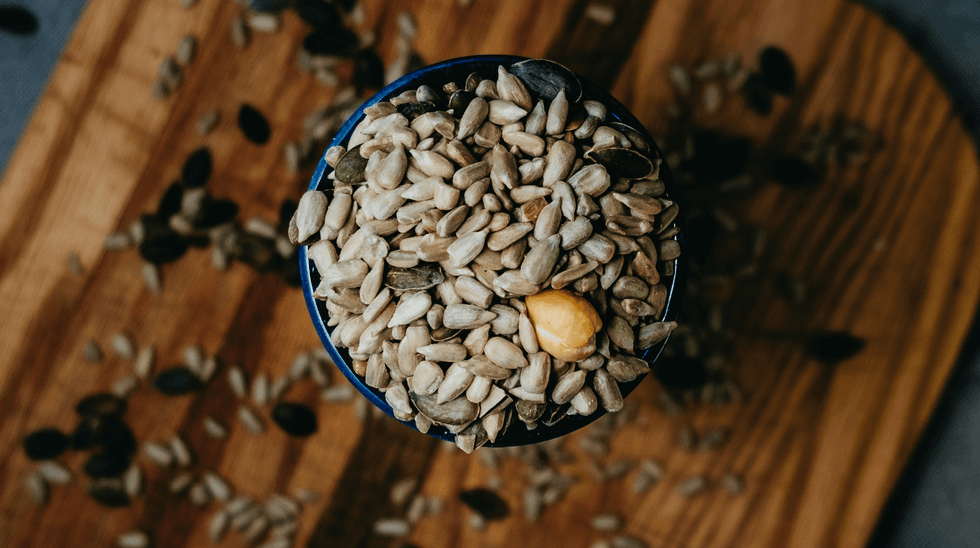Quick version
Vitamin E is an antioxidant that protects the body's cells from damage caused by free radicals, which reduces the risk of aging and diseases such as cardiovascular disease and cancer. It strengthens the immune system, protects white blood cells and helps keep blood vessels elastic.
You can find vitamin E in foods such as seeds, nuts, vegetable oils, green leafy vegetables and avocados. The recommended daily intake is 10–11 mg for adults, it is important to be aware that too high doses via dietary supplements can be harmful.
Vitamin E is an antioxidant that protects your tissues by protecting them from the breakdown of polyunsaturated fatty acids, such as Omega-3 and Omega-6, in cell membranes. This is important because these polyunsaturated fatty acids are essential for the body's functions.
How do you get vitamin E through food?
Vitamin E is mainly found in seeds and nuts, vegetable oils and margarine, wheat germ, green leafy vegetables, avocados, whole grains and eggs. Here you can read more about how to get Vitamin E through your diet and how to avoid vitamin E deficiency. You can search for the exact vitamin E content in different foods in the Swedish National Food Administration's "Livsmedelsverket" food database.
What is vitamin E good for?
Vitamin E is an antioxidant that has several important functions in your body. One of these is to protect the body's cells from oxidative stress and damage caused by free radicals - which are reactive molecules that can be formed during normal metabolism. Vitamin E also protects the body's cells from damage that can occur when exposed to environmental factors such as pollution, smoking and UV radiation. Free radicals can attack and damage cell membranes, proteins and DNA, which can lead to premature aging and an increased risk of chronic diseases such as cancer and cardiovascular diseases.
The immune system also depends on vitamin E, which supports the function of immune cells. Vitamin E helps, among other things, to strengthen the body against infections and help regulate any inflammatory processes. The white blood cells are protected from damage by the antioxidant properties of vitamin E, which is crucial for the white blood cells to be able to fight infections effectively.
Blood circulation is also supported by vitamin E by helping to maintain the elasticity of the vessels and the protective oxidation of LDL cholesterol (the "bad" cholesterol), which in turn reduces the risk of atherosclerosis (atherosclerosis). By protecting the lipids and proteins of the cells from degradation, vitamin E is an important part of the body's overall defense system and a key factor in maintaining long-term health.
Vitamin E in dietary supplements and capsules
Vitamin E is available as a dietary supplement in the form of capsules or tablets. It is important not to exceed the recommended dose, as high intakes of vitamin E from dietary supplements can have negative health effects, such as:
- Increased risk of bleeding: This is because vitamin E can inhibit the blood's ability to clot, which can increase the risk of bleeding. Those who are already taking blood-thinning medications should therefore be extra careful not to exceed the recommendations.
- Stomach and intestinal problems: High doses that exceed the daily intake recommendation can cause diarrhea, stomach pain and cramps, and nausea.
- Reduced effect of certain treatments: Research has shown that antioxidants, including vitamin E, can protect cancer cells from oxidative stress, which can lead to increased tumor growth and spread. A Swedish study from Karolinska Institutet indicates that supplementation with antioxidants such as vitamin E can stimulate the formation of new blood vessels in tumors, which nourishes cancer cells and facilitates their spread.
Recommended daily intake of vitamin E
According to the Nordic nutritional recommendations (NNR 2023), the adequate intake (AI) of vitamin E is as follows for adults:
1 alpha-TE corresponds to 1 mg of naturally occurring alpha-tocopherol.
Can you overdose on vitamin E?Natural vitamin E has low toxicity, but high intakes from dietary supplements can be harmful. The European Food Safety Authority (EFSA) has set an upper limit for daily intake of 300 mg alpha-tocopherol for adults.
Want to check your vitamin E levels?Test your levels of E-vitamin with a simple blood test and get answers to your levels.



















